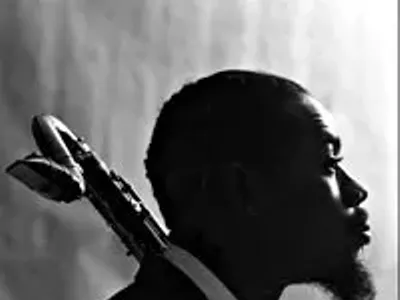
Audio By Carbonatix
[
{
"name": "GPT - Leaderboard - Inline - Content",
"component": "35519556",
"insertPoint": "5th",
"startingPoint": "3",
"requiredCountToDisplay": "3",
"maxInsertions": 100,
"adList": [
{
"adPreset": "LeaderboardInline"
}
]
}
]
By day he’s a security guard, manning the entrances to the DIA. He’s the guy you don’t notice, seemingly faceless, yet graceful, in issued attire. He stands off the beaten walkway, humdrumming the hours away, anonymously, with a composed but bored expression. He looks like a guy who could live alone, subsisting on paltry wages, with lonely dinners of squishy peas and cardboard meat eaten out of heated aluminum, washed down with dashed hopes and red wine from liter bottles.
But all that is simple assessment, quick cliché judgment of a man employed to stand guard, because, of course, everybody has a story. Everybody.
The bespectacled security guy is Michael Rosemond, and he is immediately disarming. With large hands and graying whiskers, the man has a certain calmness. Calmness one might expect from a guy who put in 30 years as a social worker, who has raised four children, and who has written of book of poetry filled with stanzas that unabashedly — almost astonishingly — reflect on the nature of profound love.
Rosemond’s 1998 book, the self-published This is My Love, is a slim volume rife with observations of wakefulness, doubts and sexual affirmations, most of which are inspired by Rosemond’s muse Coody, whom he met almost four years ago after the breakup of his marriage. The set begins with intensity, describing sensual passion that occasionally unwinds into melancholy and sometimes remoteness. From almost gushy (You entered my life as a healing rain/ Impassioned kisses became rivers that filled/time etched into life giving reservoirs) to truly lovely sentiment (Your love caused my heart to turnabout as a distant planet; a world that finds its eclipse and peace only in you), the book’s hushed verse is unashamedly tender, therefore, one might say, antiquated.
“It goes back to the old dudes,” the 52-year-old says, smiling wryly. “I’m an old dude.”
Rosemond’s modest sixth-floor downtown apartment is warm and comfortable, well-lit in the inked shadow of nighttime Detroit.
Framed African proverbs, bits of folk art and pieces of junk turned into subtle wall hangings pepper the space. Books are neatly stacked on the floor. He’s obviously a fan of Walter Mosley and Pablo Neruda.
His sharp-angled glass-top desk is bordered by two small, framed oil paintings. The sensitivity in the spare landscape paintings is telling. They were gifts to his mother from his father, painted while he was stationed in Guam during World War II.
His pop was a chauffeur, who died of a heart attack when Rosemond was 12.
“That was the first funeral I attended,” he says. “He was what I saw a man to be; one who took care of his wife, one who respected his wife. One who took care of his family. He was an old-fashioned guy, didn’t want her to work. When he died, my mother just rolled up her sleeves and went to work.”
Ma Rosmond raised the five siblings and taught them all to read by the time each hit kindergarten.
The 83-year-old Irene Rosemond always loved poetry, history. Still does. She’s an author-editor herself, and her Reflections: An Oral History of Detroit is a startlingly beautiful book that traces Detroit’s working-class history and harsh grace through the voices of a select few inhabitants.
“I retired [from social work] when I was still vibrant enough to write. When I still had my mind,” he laughs. That was five years ago. Four years ago he began a novel, now near completion, about the cultural conflict between Detroit’s Chaldeans and African-Americans. “I did a year of straight research and interviewed Detroit homicide detectives. I’ll take the novel around to publishers, and if something happens, great. If nothing happens, that would be great too. It doesn’t matter because it has been such a joy to do.”
The conversation steers to today’s hip-hop, much of which, to generalize, feeds a greedy hope for easy riches — where Donald Trump’s ivory tower is an enviable place to hang — and an astonishing hatred of women.
“I can appreciate the knowledge of the craft, in taking the emotion of ideas and crafting it into words,” he says. “But when it comes down to who can be the nastiest, there becomes a point where the scale is tipped. … A lot of these young men and women are brilliant. But I think it can be communicated in such a way that the women don’t have to be bitches and whores. A lot of that anger is a resentment, the disrespect …”
Hence, Rosemond’s idea of making a CD of his slow, early Neruda-inspired epistles “rapped” over jazz. At live readings he often orates over Miles Davis and even Pat Metheny. “I think one of the pleasing things at a poetry reading is when a woman comes up and says, ‘Wow, you really love that woman.’”
Rosemond reads his piece “Breathless in Time” to Miles’ “Blue in Green.” His voice dips to a croon that could raise an Isaac Hayes brow. His words move melodically, assisted by fluid hand gestures, over the piece’s elegant ostinato.
His prose is unironic, heart-swelling, an old-school romanticism he considers necessary and truthful.
“I write from the standpoint of recognizing the need to love. I’m talking about the aspect of loving life and loving someone else and appreciating their life. That’s what’s overlooked today, the total appreciation of this gift we have.”
The writing has helped bring Rosemond to a kind of Taoist place of simplicity. The guy who is thankful for his security cop gig — for allowing him to do other things — has no regrets.
Brian Smith is Metro Times music editor. Send comments to bsmith@metrotimes.com. Michael Rosemond can be contacted at mrosemond@comcast.net




